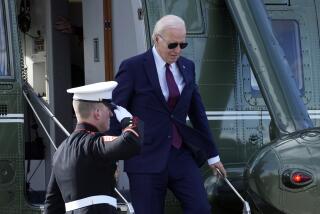Customs Rejects Plan to Relax Border Checks
- Share via
WASHINGTON — U.S. Customs officials have rejected two vice presidential task force recommendations that would reduce customs inspections at international airports and create an “open border” with Canada in an effort aimed at eliminating delays at customs checkpoints.
Customs Commissioner George J. Weise said that the federal government has considered many ideas intended to improve entry and exit procedures at international portals but that relaxing border inspections is one of the bad ideas offered by the National Performance Review, a task force on reinventing government headed by Vice President Al Gore.
“That’s just not reasonable,” Weise said. “It’s not doable at any time in the foreseeable future. It’s kind of pie in the sky and it’s not being considered seriously.”
Sen. Dianne Feinstein (D-Calif.), who opposed the proposals, said that a Treasury Department official informed her Wednesday that the more radical proposals for the Canadian border and for the United States “are dead,” in part because of opposition that had been raised.
Federal officials Wednesday unveiled details of the task force’s accepted proposals affecting customs and immigration policies. Miami International Airport, which has been designated as a federal “reinvention lab,” will test the new law enforcement practices aimed at speeding travelers through the nation’s busy international airports.
Customs officials said that the new procedures at the Miami airport will allow federal inspection agents to collect information about passengers before they arrive at immigration stations in the airport and help law enforcement officers detect passengers or materials that should not enter the country. The interagency test will involve officials from the Customs Service, the Immigration and Naturalization Service, the Agricultural, Animal and Plant Health Inspection Service, the Passport Agency, the Fish and Wildlife Service, domestic and foreign airlines, as well as local and regional governmental groups.
Bob Stone, the task force’s project director, said that the Miami test, if successful, could be expanded to other domestic ports of entry, including Los Angeles International Airport, within 18 to 24 months.
The Times reported last weekend on the final draft of the report, which contained the suggestions to open the Canadian border and relax some customs inspections.
Weise said that the report reflected task force discussions as the group followed instructions by the vice president to throw off the shackles of conventional thought and not be afraid to advance unusual ideas. But, he and other Administration officials said, some of the task force ideas were “blue-sky thinking” and “long-term recommendations” unlikely ever to become federal policy.
Among the rejected ideas was one to abolish checkpoints on the Canadian border, permitting passage between the two countries with little or no checking. Weise said that suggestion was never taken seriously by his office, which must approve any such recommendation before it can be implemented.
Other rejected proposals included reducing passenger inspections on flights from countries that are considered “low-risk” for harboring drug smugglers or terrorists.
Given the politically sensitive nature of that idea, federal customs officials went out of their way to deny that it would be implemented. In a news release that coincided with the announcement of the Miami airport tests, Weise stressed that Customs is “first and foremost a law enforcement agency” dedicated to protecting U.S. borders.
“There have been reports that among the proposals being considered is one that would allow aircraft from certain ‘low-risk’ countries to enter without any examination by Customs or the Immigration and Naturalization Service,” said the statement released under Weise’s name. “I want to state emphatically that under no circumstances would the Customs Service approve such a plan.”
However, the task force’s recommendations were not much different from previous proposals that Weise’s office had pushed internally even before the National Performance Review’s study was completed. A March, 1995, Customs report, entitled “Strategic Passenger Team,” obtained by The Times suggested that up to 90% of passengers arriving at U.S. airports could be allowed to enter the country without seeing a federal inspector first.
Weise said in an interview with The Times that news reports on the plan had triggered an outcry on both sides of the U.S.-Canadian border but added that “nothing has happened to move one step toward implementing” an open border between the two countries and that to do so would require “lots and lots of discussion with the people of Canada.”
Fulwood reported from Washington and Turner from Toronto. Times staff writer H.G. Reza contributed to this story from Los Angeles.
More to Read
Sign up for Essential California
The most important California stories and recommendations in your inbox every morning.
You may occasionally receive promotional content from the Los Angeles Times.










